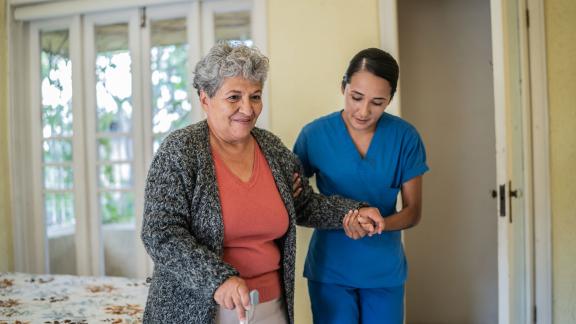Integrating T Level students into family hub services

Overview
The Central Family Hub in Thatcham simplifies access to support by bringing together multiple organisations in one location. This collaborative approach ensures that families receive the right help at the right time, for example infant feeding support, parenting classes, health visiting, birth registration, baby and toddler groups, mental health support or advice.
The Central Family Hub was approached by Kennet School, when it began to offer health T Levels to its sixth form students in 2022.
Key benefits and outcomes
- T Level students bring innovative ideas and approaches to the service.
- Having students in the hub increased the number of appointments they could offer.
- Mentoring and coaching T Level students provides development opportunities for staff.
What the organisation faced
A key challenge for the hub was maximising its limited resources to ensure that families most in need could access support.
What the organisation did
Kennet School worked with the hub to develop and integrate a T Level industry placement model into its services that would address the gaps in support for those who most need it. Hub staff recognised the value of students joining as part of their team and assisting them with day-to-day activities.
“As the placement progresses and T Level students gain confidence, they build relationships with families in group settings. When appropriate and with supervision, they provide reassurance to users during interventions with support workers, such as baby massage and postnatal sessions.”
Jo Herbert, Family Support Worker
Students already have valuable nursing and caring skills, so they can work with the team to provide wellbeing advice and support. At the same time, they gain practical experience of core elements of their T Level course, such as managing information and data and person-centred care. The support they receive from healthcare professionals also helps them become more confident communicating with carers and service users.
Results and benefits
One of the main benefits for the hub is that, while the placements support the students’ educational development, they also help the hub maximise its service delivery.
Hub staff value the fresh perspectives and innovative ideas the students bring to the team. Many students have expertise with technology and combine this with creative ideas to develop practical solutions that improve the health support for the service users.
For instance, they introduced staff to useful apps like the NHS Food Scanner app, designed to help people make healthier choices, and they have created health promotion boards. They also suggested activities such as make and take handicraft sessions for parents and children, which were well received.
Because they are the same age as some of the target groups, the students have clearer insights into meeting the needs of younger clients while contributing to the strategic goals of the hub. For example, when redesigning services to engage 16- to 19-year-olds in community hubs, one student proposed nail art workshops as a creative outlet. These workshops attracted teenagers and provided a safe space for them to express their emotions and seek support.
Placements in the hub can also inspire students to work in health settings that they would not have been aware of before, benefiting the wider health workforce. A recent T Level student who had a placement with the hub has decided to pursue a career in social care.
“A T Level student may have an idea of their future career but may not be aware of the full range of careers opportunities on offer. Working in the family hub provides them with real insight. It also allows my staff to mentor and coach, giving them CPD opportunities while embedding knowledge.”
Sharon Pearce, Central Family Hub Manager
As the placements benefit the future workforce, they also benefit existing staff by providing opportunities for them to develop their own skills, providing long-term benefit to the hub.
Key takeaways
- T Level health students bring valuable skills learned on their course to their placements, maximising the hubs limited resources.
- Many initiatives have come directly from the students’ broader interests.
- As the students are a similar age to the hubs’ younger clients helps students see how to make services more relevant and effective, meaning their placements adds strategic value to the service.
- Welcoming students into the team has also given hub staff the opportunity to develop their mentoring and coaching skills.
For more information, contact Sharon Pearce, central family hub manager or Beth Kelly, head of early years/family hubs.



